Voices: Rachel Reeves: Why it’s time Britain had a woman in No 11

As a woman working in politics and in economics, you get used to working in a world that doesn’t look like modern Britain. Still, in 2024, no woman has served as governor of the Bank of England, or first permanent secretary to the Treasury, or chancellor of the Exchequer.
If Labour has the privilege of forming the next government, I will have a privilege of my own: to be the first woman to serve as chancellor.
I have always believed that the opportunity to serve comes with responsibility, too. The responsibility to show to our daughters – to show my daughter – that there should be no limits on their ambition. And the responsibility to drive progress for women, to stand up for women whose work is too often undervalued. To speak, and act, in the interests of women.
And the truth is, after 14 years of Conservative government, women are worse off. Women bore the brunt of austerity after 2010. Women were worst affected by the economic and social impact of the pandemic. And too often it is women who bear the burden of insecure work, low pay and overstretched public services.
Labour’s central economic mission is to get our economy growing again. I want to be clear about what that means for women – why an economic policy centred on equality for women should also be an economic policy centred on growth.
One of the things that successive Conservative governments have got wrong is to think we can build a strong economy based on the success of a few people, a few places, and a few industries. We have seen where that leads: stuttering growth, stagnant productivity, and deep regional divides.
Labour’s alternative is about the recognition that if we want to build a strong economy, that must be based on the contribution of the many. And that must mean a growth plan centred around women.
Fifty years after the Equal Pay Act, women still earn on average 14 per cent less than men. On current trends, we may have to wait until 2044 for the UK’s gender pay gap to disappear.
Women cannot afford to wait that long. And nor should they have to. Which is why, last year, I asked former TUC general secretary Frances O’Grady to lead a review into how we can go further and faster in closing that gap, and make the next great strides towards abolishing it once and for all.
We know that ensuring women can contribute to our economy will create growth. To take one example: the Rose review of female entrepreneurship showed that if the UK were to achieve the same rates of female entrepreneurship and business ownership as our “best in class” peers, that could add £200bn to our GDP.
But if we want to create shared prosperity and recognise the contribution of women, we can’t only focus on businesses at the frontier. We need to turn attention too to what I call the everyday economy – those industries on which we rely for good lives and strong communities, which employ tens of millions of people but are too often undervalued. Women disproportionately work in our everyday economy, doing vital work.
The industrial strategy of the next Labour government won’t just be the top-down, narrow-focused industrial strategy of the past. It will focus not just on the dynamic industries of the future – on renewable energy, data, steel – but also on everyday sectors like childcare, social care and retail, to boost productivity and pay together.
Just take childcare: one of the single biggest drivers of the gap between men and women in pay and workforce participation. As economists at Stanford and the London School of Economics have shown, the child penalty in the UK is substantially wider than in other European countries such as France, with far too many women kept out of the workforce for extended periods after having young children.
As the clamour around this year’s spring Budget dies down, it is worth revisiting the chancellor’s flagship commitment from one year ago: the expansion of new funded childcare places to children aged between nine months and two years old.
With just six weeks until rollout, it is becoming increasingly clear that the Conservatives’ plan was little more than hot air – as my colleague Bridget Phillipson warned last week, “a pledge without a plan”.
Labour’s research reveals that 180,000 places are at risk from more than 3,000 nursery closures due to the Tories’ botched offer. Separate surveys meanwhile have found that more than half of private, voluntary and independent nurseries of England are unable to meet existing local demand and are unlikely to, or unsure they could, offer any additional places for two-year-olds.
The UK’s broken childcare system won’t be fixed with gimmicks – which is why Labour has commissioned an expert-led early years review, headed by the former chief inspector of Ofsted, David Bell.
Labour will work to build the modern childcare system that working people deserve, starting with our commitment to free breakfast clubs in every primary school. We will rescue our public services, as we have done before.
And women will be at the heart of a plan for economic growth.

 Yahoo News
Yahoo News 
